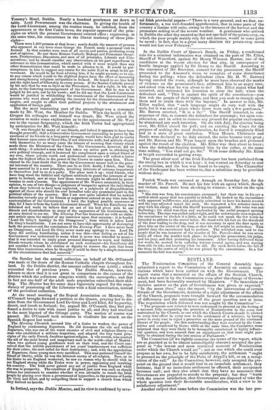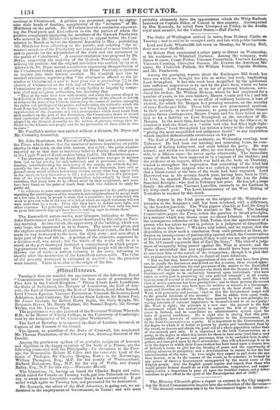SCOTLAND.
The Nonintrusion Committee of the General Assembly have submitted a report to the Commission of Assembly on certain nego- tiations which have been carried on with the Government. The report states that a memorial on the affairs of the Scottish Church, which was sent in by the Commission soon after the change of Govern- ment, had been favourably received by Ministers. "No immediate or decisive answer on the part of Government was given or expected." "In the mean time," says the report, "by the intervention of certain. friends of the Government, desirous of a right adjustment of the affairs of the Church, proposals were brought forward for the accommodation of differences and the settlement of the great question now at issue. The negotiation which followed was not sought by the Committee"— " The proposals now referred to were understood to proceed on the footing of a measure fully recognizing the principle of Nonintrusion in the sense now maintained by the Church, as one which the Church Courts should be allowed to carry into effect in every case in the settlement of a minister, by having power in every case to reject a presentee on the mere ground of the continued dissent of the people. On this understanding they were received by the Com- mittee and considered by them; while at the same time, the Committee were informed that they were likely to be favourably entertained in highly influen- tial quarters, and were assured that an adjustment on that basis might pro- bably be obtained during the late session of Parliament." The Committee (if we rightly construe the terms of the report, which are so guarded as to be almost unintelligibly obscure) accepted the pro- posal as "the lowest and most restricted measure of Nonintrusion under which the Church would act " ; not as one which she could ever propose as her own, for to be fully satisfactory, the settlement "ought to proceed on the principle of the Duke of Argyll's bill, or on a recog- nition of the call." As the Committee, however, only accepted the pro- posal on the ground that it would lead to an immediate settlement, they intimate, that if no immediate settlement be effected, their acceptance becomes null ; and they also admit that they have no assurance that Government are prepared to accede to the proposal ; but they "learn with the utmost satisfaction, that Government are disposed to take the whole question into their favourable consideration, with a view to its satisfactory adjustment." Another subject that came before the Commission was the late pro-
ceedings at Culsalmond. A petition was presented, signed by eighty- nine male heads of families, complaining of the " intrusion " of Mr. Middleton on the parish. Dr. MTarlane moved a resolution empower- ing the Presbytery and Kirk-officers to cite the parties of whom the petition complained (including the members of the Garioch Presbytery who assisted in Mr. Middleton's induction) to appear before the Com- mission in March or before the General Assembly in May ; prohibiting Mr. Middleton from officiating in the parish ; and ordering "the re- manent members of the Presbytery not complained of to meet forthwith and to provide for the ministration of the word and the sacrament in the parish of Calsalmond." A counter-resolution was proposed by Dr. Bryce, supporting the majority of the Garioch Presbytery and dis- missing the petition : but the original resolution was carried, by 54 to 3. Afterwards, Dr. Bryce moved a resolution expressing disapprobation of the Culsalmond rioters, and requesting the Home Secretary to institute an inquiry into their lawless conduct. Mr. Candlish met this by another resolution, regretting that "the obstruction offered to the in- trusion at Culsalmond is said to have given rise to proceedings [!] in the church of Culsamond on the 11th day of November " ; stating that the Commission are desirous to afford every facility to inquiry by compe- tent civil and religious authorities, but declaring that
"They at the same time view with anxiety and alarm the course alleged to be followed in this instance by an inferior judicatory of the Church in settidk at defiance the laws of the Church, obstructing the course of justice, outraging the rights and privileges of the people, and subverting the authority which the Lord Jesus has instituted in his house ; and being deeply impressed 1% ith an apprehension of the disastrous and fatal consequences which must result from such conduct on the part of the Presbytery, the Commission desire to record their conviction of the absolute necessity for the most decided measures being adopted by the General Assembly for the redress of grievous wrongs thus in- ilicted on the Church and people, and for the prevention of these evils in time to come."
Mr. Candlish's motion was carried without a division, Dr. Bryce and Mr. Cumming dissenting.
Mr. John Henderson, the Provost of Paisley, has sent a statement to the Times, which shows that the number of persons depending on public charity in that town, on the 20th instant, was 9,701; the gross number reported up to that date as receiving relief in Paisley and other places in the Upper Ward of Renfrewshire being 10,670. Mr. Henderson says-
" The allowance given by the Local Relief Committee averages in amount from licL to lid. per day for each individual, and in provisions only. Many families, notwithstanding the inclemency of the season, are without fire fre- quently for two days at a time. Hundreds, if not thousands, have sold or pawned every article of their bed or body clothes, except what they appear with an the street, to keep themselves in life ; and such is the desire of a great por- tion of the population to maintain themselves independently by their own exertions, that many have to be offered relief by their neighbours, and some have been found on the point of death from want who declined to apply for public aid. " In reference to some statements which have appeared in the public papers regarding the unwillingness of the weavers in this neighbourhood to accept work at a low rate, it may be proper to state that a committee has commenced this week to give out webs in the way of relief, at which an expert workman will not earn more than 5s. a week. From this they have to deduct rent, light, and other expenses. Yet yesterday and today the demand for these webs has been so great that crowds of people have been in waiting eager to obtain them."
The Barrowfield cotton-works, near Glasgow, belonging to Messrs. John Bartholomew and Co., were almost destroyed by fire early on Tues- day morning. At two o'clock, the upper story of the building, which was very large, was discovered to be in flames. The alarm was given, and the engines assembled from all quarters. About four o'clock, the fire had made its way downward to the next, the third story ; and soon after, a large part of the roof fell in. A portion of the structure, separated by a division-wall, was saved ; but the whole of the works will be at a stand, as the part destroyed included a compartment in which prepar- ing-processes were carried on. Five hundred people will therefore be thrown out of work ; a serious calamity to the town, following so shortly after the destruction of the Lancefield cotton-mills. The value of the property destroyed is estimated at 40,0001.; but the premises were insured. There is no clue to the origin of the fire.



























 Previous page
Previous page